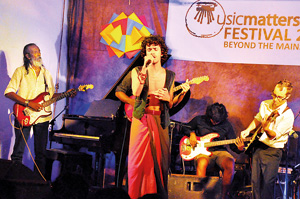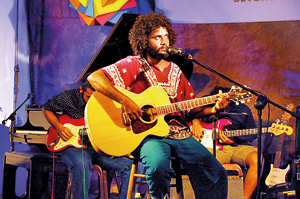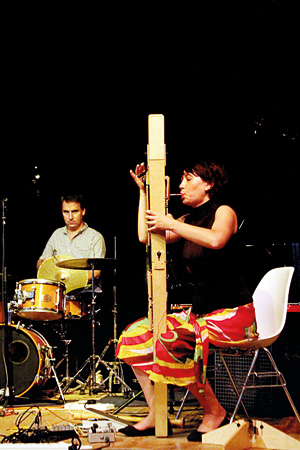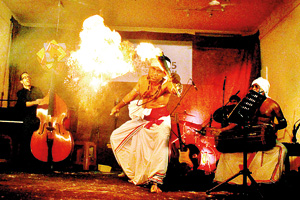Exciting, confusing: We are talking music!
The annual Musicmatters Festival never fails to excite, and it generally leaves a few of us confused as well. But year after year they pursue the venture, building a strong reputation for solid music, and creating a unique platform for local and international collaboration that pushes the boundaries of what is musically familiar.

Leila Adu Pix by Indika Handuwala
The 2015 festival opened at Goethe Institut on the night of Thursday, August 13, with a fringe event featuring most of the artists from the main stage nights. It goes without saying that a “fringe” event of a non-mainstream festival is bound to be somewhat difficult to comprehend, and this was very true of the first act. The general feel of Isaac Smith and Kei Watanabe’s opening set was that of a ‘Young Person’s Guide to the Contemporary Percussion Orchestra’. They appeared to simply pick up instruments (most seemingly improvised) at random and make sound. The overall effect was a rising and falling chaos built on looped motifs of the assorted instruments and Watanabe’s clear, haunting voice, which provided no familiar inlet for the uninitiated to latch on to.
The night became more accessible though as Sarani and Uvindu Perera, Harshan Gallage, Isuru Kumarasinghe and Amila Sandaruwan took the stage, creating heavily layered impressions with more solid melodic and rhythmic patterns. Their music, again, does not lend itself to interpretation though it gives strong wings to imagination.

Isaac Smith, Sum Suraweera and Feng Xia
What festival director Sum Suraweera meant when he told us a few weeks ago about making sure the featured artists at the festival are “well developed” in what they do was made very clear when Xu Feng Xia took the stage with her guzheng (or zheng for short).
The instrument is of traditional Chinese origin and resembles a horizontal harp. Tuning on its 18 or more strings is controlled by a number of movable bridges. Feng Xia plucks at these with strength and vigour, accenting the instruments (Sum Suraweera on drumset and Isaac Smith on double bass accompanied her on Thursday fringe night) with forceful traditional vocalizing. On main stage nights Friday and Saturday, she was accompanied by Darren Moore on drum set and Timothy O’Dwyer on saxophone.

Amila Sandaruwan
The three play together regularly across the globe as the Shangyin Trio. Feng Xia is distinctly playful, possessing a confidence and command on stage that we rarely ever see in Colombo. O’Dwyer matches this playfulness with a sly ease and the three together engage in subtle conversation over complex rhythms, rising to ridiculous heights of excitement, leaving the audience breathless.
While the Shangyin Trio was more accessible than the performers on fringe night, the complexity of their work was palpably awe-inspiring. Brooklyn-based featured artist Leila Adu’s sets on the other hand were much simpler and easier, as she predicted, to understand. On fringe night she brought a number of others on stage with her, to create little poetic moments with some drums, singing guitar lines, snippets of sung and spoken word, and rich keyboard work. Friday and Saturday nights she sang at Barefoot from her recorded albums, as well as a completely fresh blues-funk-hiphop infused piece “Fields of Joy”. Her voice is sweet and clear, sometimes with a hard edge, which works fantastically with the intensity of her lyrical content and the drama of the piano beneath her fingers.

Darren Moore and Miako Klein
Not many of us are familiar with the sounds, the workings or the intricacies of the double bass. Clayton Thomas makes it his work to introduce a global audience to what the instrument can do, and its capacity to hold an audience in its own right, despite usually being only a sound-filler. It is nearly impossible to imagine the breadth of sounds he draws from the instrument, and the confident ease with which he builds comprehensive structures of these. But many of us in the audience were generally unfamiliar with even the mainstream profile of the double-bass, and this begs the question of whether the significance of what Thomas does (and many of the other artists too, for that matter) was recognized at the festival.
Musicmatters is nevertheless drawing a more diverse and more interested audience year by year. The reach of the music the organizers promote seems to be expanding, and a willingness to experience unfamiliar musical structures, catching on. And apart from simply introducing new music to Colombo, the festival is also very actively doing the ground-breaking work of exploring international collaboration between experimental artists.
One of the highlights of Mainstage Day One was Musicmatters Transcoastal, a collaborative project between musicians from Colombo and Batticaloa, exploring the common and progressive boundaries of different kinds of music. Lavanya Mahadeva, Kisnaveni Palasingam, Selvaraj Rajiv, Baskaramurthi Satheeswaran and Meiyanathan Ketheeswaran are happy to drive nine hours into the wee hours of the morning to share the “new joy” they have found in collaborating with artists from Colombo, hearing familiar sounds reinterpreted via unfamiliar instruments. The sound of the collaboration is still very traditional, with pulsing rhythms to get any listener dancing, though the addition of drum set, double-bass and other western instruments makes the sound fuller than one is traditionally accustomed to.

Baliphonics
Into this collaboration, the festival plugged Brooklyn-based songbird Leila Adu and Berlin-based Miako Klein, creating an interesting and obviously educational performance and listening experience. Klein also played violin with the Brahminy Kites, another more familiar folk-electronic-experimental offspring of the Musicmatters Collective, and introduced Colombo to the box-structured contrabass recorder.
Another collaboration inspired by traditional art is Baliphonics which brings the sounds of the hidden Bali ritual to a broader audience. Again, the drum-set and bass add depth to the raw, hard-edged sounds of the traditional drum and vocalizing of ritual exorcist brothers Prashantha and Susantha Rupathilaka. There are obviously problems with the medium and mode of engagement, like amplification of sound, limited performance space and maintaining the fourth wall, but the quartet keeps the spirit of the art alive as much as possible, bathing the musical instruments in fire and letting the rhythm literally and metaphorically take control of the situation.
Musicmatters has been faithful over the years to pursue their dream of expanding the listenership for non-mainstream music in the island. Geothe Institut continues to support their work, providing a rare platform for the expansion of musical boundaries. They must be applauded, and the proprietors of Barefoot Café even more so, for having extended their support towards the venture by providing an alternate venue for the main stage day events at the eleventh hour.


